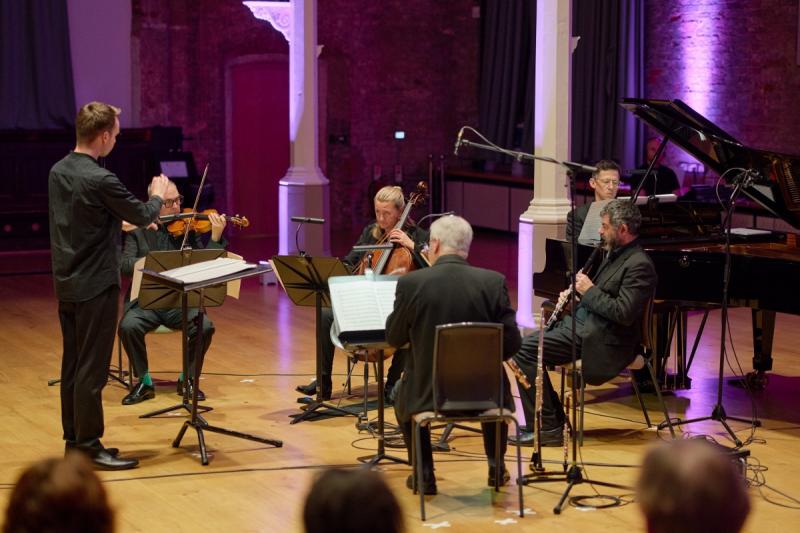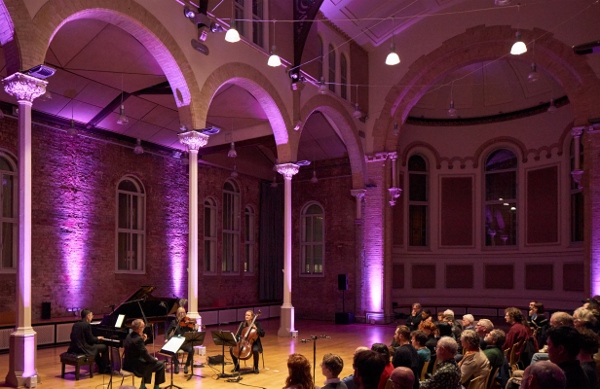Psappha, Hallé St Peter’s, Manchester review - pioneers of today’s music undaunted | reviews, news & interviews
Psappha, Hallé St Peter’s, Manchester review - pioneers of today’s music undaunted
Psappha, Hallé St Peter’s, Manchester review - pioneers of today’s music undaunted
Premieres and rewarding new experiences from champions of creativity

Manchester's champions of contemporary music, just stripped of support by Arts Council England, are undaunted and last night continued doing what they do best. A small ensemble of virtuoso players brought a large and appreciative audience at Hallé St Peter’s a set of four challenging pieces, with a world premiere and a UK premiere among them.
Challenging, because the music was all complex and in each case spoke a language of its own – but rewarding, too, because of the sense of exploration and the sheer ingenuity of the sounds being heard. Two of these were by young composers championed by Psappha, a testimony to the work the group has done for more than 30 years (both with and without ACE recognition).
Ostara, by Dani Howard, for clarinet, cello and piano (Dov Goldberg, Jennifer Langridge, Benjamin Powell), is a 12-minute, meditative piece (though it develops its moments of exhilaration and liveliness), beginning from the simplest elements such as held open strings, single-note repetitions and tremolos, and developing in intensity and – in the cello part in particular – real lyricism.
More Parlour Music, by Christian Drew, which was written with the help of Psappha’s own “Composing For …” project and received its world premiere, was for me one of the most interesting solo piano pieces I’ve heard for a long time. Perhaps because it’s a kind of study, in which an ornamented and embellished, neo-baroque melodic line is played against accompanying chords from a different era and style. Christian Drew said the result was “like Chopin on acid”, but by the time both elements were in the lower range of the keyboard the effect was also reminiscent of Brahms’s thick chording. There’s more to it than a two-element experiment, though, as the “accompaniment” at times becomes a melody element in itself and rhythmic structures are contrasted as if two different things are happening at once.
 It must be fiendish to perform, and, as the composer put it (of Psappha’s Benjamin Powell), “I don’t know how Ben plays it, but I’m very pleased that he does.”
It must be fiendish to perform, and, as the composer put it (of Psappha’s Benjamin Powell), “I don’t know how Ben plays it, but I’m very pleased that he does.”
Linda Catlin Smith’s half-hour piece for piano quartet, Dark Flower, received its UK premiere. Written in 2020, it’s often slow moving and dreamy, using slow, repeated string chords, piano arpeggios and chords that are rich and strange, wisps of melody, and held string unisons (often on harmonics) which must be extremely hard to get right but were achieved with ease. It has a melancholy harmonic language of its own, a wide range of expressive effects and instrumental textures, and some very beautiful moments. Executants (pictured above) were Benedict Holland (violin), Heather Wallington (viola), Jennifer Langridge (cello) and Benjamin Powell (piano).
To end the continuous programme, Psappha livened things up with the rather anarchic Indigenous Instruments, by Steven Mackey, allegedly representing (in his words) “folk music from a culture that doesn’t exist”. Make of that what you will: it has its weirder aspects, as the violin’s G string is tuned more than an octave down (resulting in some grunting, grumpy-sounding contributions to the general melée) and other instruments have to be modified from their normal playing state, too. It’s rhythmically very complex, and the line-up of Conrad Marshall (flutes), Dov Goldberg (clarinet), Benedict Holland (violin), Jennifer Langridge (cello) and Benjamin Powell (piano) was conducted by Thomas Goff.
By the time we arrived at the final jam session – much enjoyed, it seemed, by Langridge’s crazy pizzicato cello – everyone was having a joyous, near-celebratory, time.
rating
Explore topics
Share this article
The future of Arts Journalism
You can stop theartsdesk.com closing!
We urgently need financing to survive. Our fundraising drive has thus far raised £49,000 but we need to reach £100,000 or we will be forced to close. Please contribute here: https://gofund.me/c3f6033d
And if you can forward this information to anyone who might assist, we’d be grateful.

Subscribe to theartsdesk.com
Thank you for continuing to read our work on theartsdesk.com. For unlimited access to every article in its entirety, including our archive of more than 15,000 pieces, we're asking for £5 per month or £40 per year. We feel it's a very good deal, and hope you do too.
To take a subscription now simply click here.
And if you're looking for that extra gift for a friend or family member, why not treat them to a theartsdesk.com gift subscription?
more Classical music
 Anja Mittermüller, Richard Fu, Wigmore Hall review - a glorious hall debut
The Austrian mezzo shines - at the age of 22
Anja Mittermüller, Richard Fu, Wigmore Hall review - a glorious hall debut
The Austrian mezzo shines - at the age of 22
 First Person: clarinettist Oliver Pashley on the new horizons of The Hermes Experiment's latest album
Compositions by members of this unusual quartet feature for the first time
First Person: clarinettist Oliver Pashley on the new horizons of The Hermes Experiment's latest album
Compositions by members of this unusual quartet feature for the first time
 Gesualdo Passione, Les Arts Florissants, Amala Dior Company, Barbican review - inspired collaboration excavates the music's humanity
At times it was like watching an anarchic religious procession
Gesualdo Passione, Les Arts Florissants, Amala Dior Company, Barbican review - inspired collaboration excavates the music's humanity
At times it was like watching an anarchic religious procession
 Classical CDs: Camels, concrete and cabaret
An influential American composer's 90th birthday box, plus British piano concertos and a father-and-son duo
Classical CDs: Camels, concrete and cabaret
An influential American composer's 90th birthday box, plus British piano concertos and a father-and-son duo
 Cockerham, Manchester Camerata, Sheen, Martin Harris Centre, Manchester review - re-enacting the dawn of modernism
Two UK premieres added to three miniatures from a seminal event of January 1914
Cockerham, Manchester Camerata, Sheen, Martin Harris Centre, Manchester review - re-enacting the dawn of modernism
Two UK premieres added to three miniatures from a seminal event of January 1914
 Kempf, Brno Philharmonic, Davies, Bridgewater Hall, Manchester review - European tradition meets American jazz
Bouncing Czechs enjoy their Gershwin and Brubeck alongside Janáček and Dvořák
Kempf, Brno Philharmonic, Davies, Bridgewater Hall, Manchester review - European tradition meets American jazz
Bouncing Czechs enjoy their Gershwin and Brubeck alongside Janáček and Dvořák
 Solomon, OAE, Butt, QEH review - daft Biblical whitewashing with great choruses
Even a top soprano and mezzo can’t make this Handel paean wholly convincing
Solomon, OAE, Butt, QEH review - daft Biblical whitewashing with great choruses
Even a top soprano and mezzo can’t make this Handel paean wholly convincing
 Two-Piano Gala, Kings Place review - shining constellations
London Piano Festival curators and illustrious friends entertain and enlighten
Two-Piano Gala, Kings Place review - shining constellations
London Piano Festival curators and illustrious friends entertain and enlighten
 Echo Vocal Ensemble, Latto, Union Chapel review - eclectic choral programme garlanded with dance
Beautiful singing at the heart of an imaginative and stylistically varied concert
Echo Vocal Ensemble, Latto, Union Chapel review - eclectic choral programme garlanded with dance
Beautiful singing at the heart of an imaginative and stylistically varied concert
 Scott, Irish Baroque Orchestra, Whelan, RIAM, Dublin review - towards a Mozart masterpiece
Characteristic joy and enlightenment from this team, but a valveless horn brings problems
Scott, Irish Baroque Orchestra, Whelan, RIAM, Dublin review - towards a Mozart masterpiece
Characteristic joy and enlightenment from this team, but a valveless horn brings problems
 Classical CDs: Voice flutes, flugelhorns and froth
Baroque sonatas, English orchestral music and an emotionally-charged vocal recital
Classical CDs: Voice flutes, flugelhorns and froth
Baroque sonatas, English orchestral music and an emotionally-charged vocal recital

Add comment